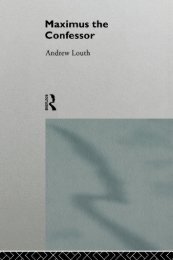Gospels of Thomas and Philip and Truth - Syriac Christian Church
Gospels of Thomas and Philip and Truth - Syriac Christian Church
Gospels of Thomas and Philip and Truth - Syriac Christian Church
Create successful ePaper yourself
Turn your PDF publications into a flip-book with our unique Google optimized e-Paper software.
linguistic capacity <strong>of</strong> children (thus Noam Chomsky) to underst<strong>and</strong>, generate <strong>and</strong><br />
transform new sentences in the language.<br />
X. Children, however, assuredly learn single words before they learn sentences;<br />
so individual words are indeed primitive in language. Now, since a word is an image<br />
(sound, inscription, etc.), we might raise the question whether there is a significant<br />
logical parallel between such ordinary linguistic icons <strong>and</strong> computer icons. For the<br />
latter— far from being mere pictures— represent files <strong>of</strong> programs as well as <strong>of</strong> data;<br />
so we might hypothesize that a word is a type <strong>of</strong> image which designates a file either<br />
<strong>of</strong> data (including images) or <strong>of</strong> a program. Thus men will, quite naturally, have made<br />
computers as simplified models <strong>of</strong> their own rationality. (Cf. Alan Turing, ‘Computing<br />
Machinery <strong>and</strong> Intelligence’, Mind 1950: ‘In the process <strong>of</strong> trying to imitate an adult<br />
human mind, we are bound to think a good deal about the process which has<br />
brought it to the state that it is in’; NB: ordinary language <strong>and</strong> life are generally<br />
analog, i.e. have continuous rather than digital truth-functions, whereas modern<br />
computers function in a binary calculus.)<br />
XI. Such a unique <strong>and</strong> extraordinary metaphysic, which might be called Spiritual<br />
Idealism, has significant parallels with (1) the Neoplatonism <strong>of</strong> Plotinus in his<br />
Enneads; (2) George Berkeley's philosophy <strong>of</strong> Subjective Idealism, according to<br />
which ‘sensible things cannot exist otherwise than in a mind or spirit; whence ...<br />
there must be some other Mind wherein they exist’ [Three Dialogues between Hylas<br />
<strong>and</strong> Philonous]; (3) Gottfried Wilhelm Leibniz' schema <strong>of</strong> ourselves as monads<br />
‘mirroring’ the Universe, with God as the Supreme Monad [Monadology 56]; (4) the<br />
ego/phenomena analysis <strong>of</strong> Immanuel Kant, where the ‘unity <strong>of</strong> consciousness<br />
preceding all empirical data,... the transcendental unity <strong>of</strong> apperception’ is in<br />
essential polarity with ‘the [sensory] manifold <strong>of</strong> all our intuitions’ [Critique <strong>of</strong> Pure<br />
Reason A1067]— see especially his eloquent ‘transcendental hypothesis’ [A779/<br />
B807]; (5) Ludwig Wittgenstein's Tractatus Logico-Philosophicus 5.64, Notebooks<br />
1914-1916 [7.VIII.16 2.IX.16], <strong>and</strong> Philosophical Investigations [#373, ‘Theology as<br />
grammar’]; (6) Martin Buber's I <strong>and</strong> Thou— see also William James's prior The Will<br />
to Believe: ‘The universe is no longer a mere It to us, but a Thou, if we are religious’;<br />
(7) Hans Reichenbach's The Philosophy <strong>of</strong> Space & Time [Dover Books, New York,<br />
n/d]; (8) Maurice Merleau-Ponty’s Phenomenology <strong>of</strong> Perception; <strong>and</strong> (9) much<br />
traditional Oriental epistemology: Hindu, Buddhist, <strong>and</strong> Taoist [recall Th 30!]— thus<br />
e.g. Daisetz Teitaro Suzuki, Essays in Zen Buddhism [2nd Series]: ‘The entire<br />
123




